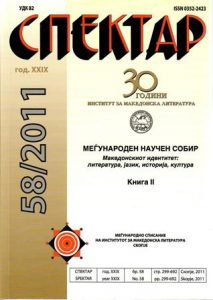ЕГЗИЛОТ КАКО ТРАЈНА ТРАУМА ИЛИ ЕГЕЈСКАТА ТЕМА – ЗАБОРАВЕНА/ЗАБРАНЕТА ИСТОРИСКА ПРИКАЗНА
EXILE AS PERMANENT TRAUMA OR THE “AEGEAN TOPIC”: A FORGOTTEN/FORBIDDEN HISTORICAL NARRATIVE
Author(s): Loreta Georgievska-JakovlevaSubject(s): Macedonian Literature, Identity of Collectives
Published by: Институт за македонска литература
Keywords: identity; history; forbidden narration; exile; trauma
Summary/Abstract: Considering all subtle contradictions perpetually emerging from the European Union – EU legislative regulations, especially the European Union Agreement from 1992, this paper investigates how EU regards its own history within the proposition of creating collective European identity. This is truly a momentous occasion to point out the deficit of permanent (or existing) identity matrixes. Thus, one would logically ask the following questions: what does Europe remember from its past? Did Europe forgot to take responsibility for the history that unfolded as a result of the process of externalized aggression. There is a link between the asymmetry of the Western European memory and the power of Western European clique that decides which stories will be narrated and which ones will be left out. The connection between the acts of allowing and denying creates a discourse, which, according to Michel Foucault is “controlled, sellected and organized” and it is directly related to the identity matrix. Therefore, this paper analyzes the “Aegean subject” as elaborated in the writings of Tasko Georgievski ; at the same, using this subject as a frame of reference, this paper also attempts to elucidate if the conflict producing “ethnonationalistic sentiment” should be elliminated by creating amnesis amongst the nations, in this case, the Macedonian nation. Otherwise, this memory will continue to create conflicts until, with time, becomes integrated in the realm of the collective memory. Surviving the trauma and exile, as described in the narratives of Tasko Georgievski, can create inmages that have simbolic meaning and morph into profound metaphor, epitomizing the search for the lost identity. The lost identity is portrayed with massive collapse of the personal identity by insult, punishment, extort, alongside with the colapse of the family identity through demolition, burning the family homes, building protectie walls, and frontiers. Moreover, the lost identity arises from the fall of the collective identity, conveyed through symbols of chaotic and unsettled situations that broadcast high levels of threat and danger. The loss of “birth land” is not associated with the 19th century patrioticromantic creed about one-nation-country; quite the contrary, it is an expression of incapacity to tell a story, it is a metaphor of deprived declaration, attempt to voice the silence of the refugees. Overall, this loss is experienced as seized opportunity to rebel one perpetually unfavorable position. Even though the silence acts as a mechanism that replaces the terror, still, the hostility can not dissapear. It purifies itself in the process of impact while the subject transforms into object, at the same time remaining impotent for action. In conclusion, I need to reiterate that the so called “Aegean theme” initially ellucidated through the narratives of Georgievski, demonstrated that the traumatic past of the refugees cannot be forgotten unless it is entirely acknowledged. Thus, if Europe desires to realize allied European identity, Europe must propose advanced matrixes for that reason. In this context, every political decision must include ethical consideration.
Journal: Спектар
- Issue Year: 2011
- Issue No: 58
- Page Range: 368-378
- Page Count: 11
- Language: Macedonian

